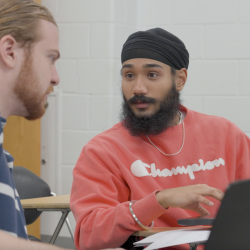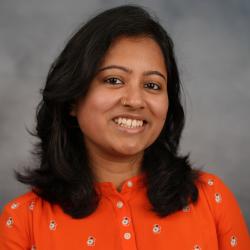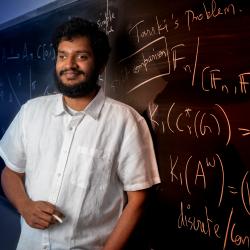Gates Foundation Awards $2.5 Million to UMD-led Adaptive Learning Platform Project
Department of Mathematics to develop and expand an individualized, textbook-free teaching and learning software platform
A new adaptive learning platform—software that replaces textbooks with individualized coursework based on students’ grasp of the concepts within a course—is coming to the University of Maryland.
The Bill & Melinda Gates Foundation recently awarded $2.5 million to Ithaka S+R, a not-for-profit academic consulting firm, to fund the expansion of an adaptive learning pilot project at UMD and Montgomery College. Students in introductory statistics courses at both institutions will use an adaptive learning platform named Acrobatiq instead of traditional textbooks starting in the fall of 2017.
“I’m very excited to be working with what I think represents the first wave of a whole new generation of teaching software,” said Scott Wolpert, professor and chair of the Department of Mathematics at UMD.
The project leaders are William ‘Brit’ Kirwan, recently retired Chancellor of the University System of Maryland, and Catharine Hill, Managing Director of Ithaka S+R. Kirwan is also Executive Director of Transforming Post-Secondary Education in Mathematics, a non-profit group that will provide advice and support for the project.
Unlike static textbooks, learning platforms like Acrobatiq can adjust their content based on individual students’ needs. For instance, in UMD’s introductory course, STAT 100, one student might need help on standard deviations while another needs practice on binomial distributions. Those students, when they engage with the adaptive learning platform, would see different content.
By allowing students to spend more time on their weaker areas instead of wasting time on areas they have already mastered, adaptive learning software can help a wide range of students with different needs.
“Because STAT 100 has so many students—about 500 this semester, from a wide variety of majors—we’re hoping to impact a large cross-section of campus,” Wolpert said.
That is part of why STAT 100 is an ideal course for the pilot program, according to Wolpert. In fact, STAT 100 is already using the adaptive platform in one of its two sections. In fall 2017, the adaptive platform will take the place of textbooks in both sections.
Acrobatiq also helps instructors track how their students are performing, both individually and as a group. The software has a list of the concepts being taught in the course and reports how many students have mastered each concept. The platform also shows how students have progressed on homework assignments and identifies students who may be lagging behind their peers.
“We are proud to be at the cutting edge of adaptive educational technology here in our college,” said Jayanth Banavar, Dean of UMD’s College of Computer, Mathematical, and Natural Sciences. “This new platform will greatly enhance the experience of our current statistics students, and we look forward to seeing it implemented in new courses and at other institutions.”
The Gates Foundation grant will fund the scale-up of Acrobatiq beyond UMD and Montgomery College, with UMD as the lead for deployment at two- and four-year Maryland institutions.
“Ithaka S+R would like to see if this approach could be spread across the country,” Wolpert said.
###
Media Relations Contact: Irene Ying, 301-405-5204, zying@umd.edu
University of Maryland
College of Computer, Mathematical, and Natural Sciences
2300 Symons Hall
College Park, MD 20742
www.cmns.umd.edu
@UMDscience
About the College of Computer, Mathematical, and Natural Sciences
The College of Computer, Mathematical, and Natural Sciences at the University of Maryland educates more than 7,000 future scientific leaders in its undergraduate and graduate programs each year. The college’s 10 departments and more than a dozen interdisciplinary research centers foster scientific discovery with annual sponsored research funding exceeding $150 million.







